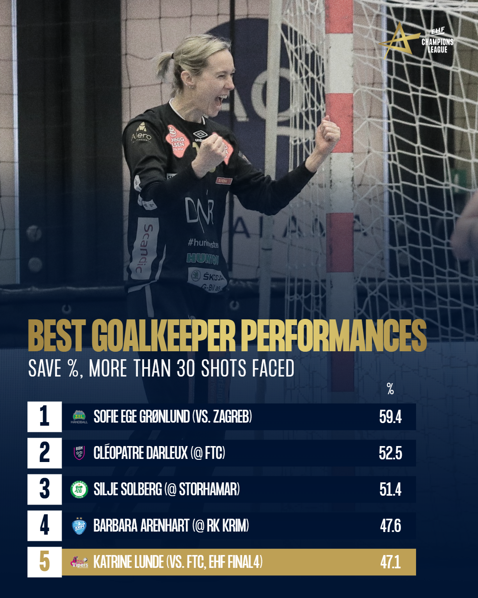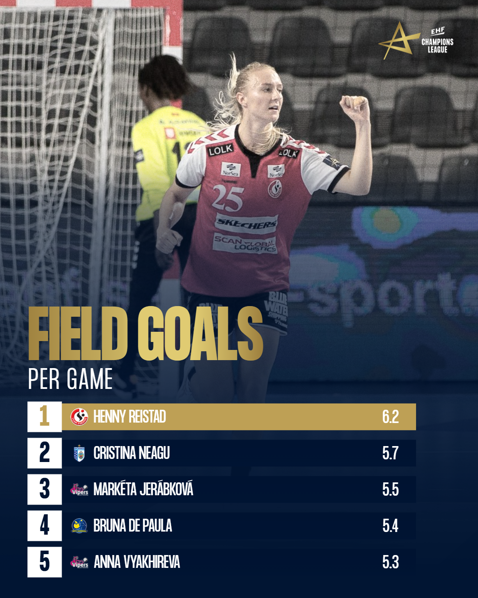With a 28:24 victory Vipers Kristiansand defeated FTC-Rail Cargo Hungaria to win their third EHF Champions League in a row. Statistically, one player especially stood out in the final: Katrine Lunde. The Norwegian goalkeeper saved her best performance of the season for the most important game and stopped 47.1 per cent of the attempts on her goal. Amongst all goalkeepers that faced more than 30 shots, it was the fifth-best performance of the whole season.

FTC, in turn, had their fourth-lowest shooting percentage (47.1 per cent) as well as their third-lowest field shooting percentage (42.2 per cent) of the season. Thus, when adjusted to 50 possessions, the team from Budapest scored just 22.6 goals per 50 possessions, their fifth lowest of the season. But for Vipers it wasn’t a great offensive performance either. 26.4 goals per 50 possessions is their fourth-lowest number of the season. As so often in big games, defence made the difference.
Likewise, as is often the case in big games, the pace of the game slowed down. Vipers were the “speed queens” of the EHF Champions League this season as they had the shortest possessions and second most possessions of the competition. In the final, however, FTC managed to force the Norwegians to their longest possessions of the season at 33.4. This only minimally surpasses their previous longest attacks, which they had in the group stage also against FTC.
One reason for the long possessions was that Vipers barely were able to run fast breaks because of the few turnovers they forced. 6.6 turnovers per 50 possessions were the fewest they forced all season. Correspondingly, this was of course also one of the reasons why the attack efficiency was not that high.
With 28.4 goals scored per 50 possessions and 23.5 goals conceded per 50 possessions over the whole season, the threefold champions rank both third in offence and defence. Like last year - where they ranked second and third - they have shown that it is not important to dominate every statistical category, but rather to be able to call up one's skills at the decisive moment.
The individual awards
After the game not only did the champions receive their trophy but individuals also obtained awards. Vipers right back Anna Vyakhireva was named MVP of the EHF FINAL4, an award she not just deserved for her performance in the EHF FINAL4, but the whole season. With 5.6 goals she scored eleventh-most per game over the whole competition. Among that, 5.3 field goals per game, which is fifth-best. Yet she had a very decent shooting percentage for back players with 61.2 per cent from the field.
Where Vyakhireva stood out amongst all the top scorers was her assist numbers. Throughout the season, no one has been credited with as many assists as her. In the EHF FINAL4, she confirmed this as she was not only the second-best scorer of her team (five goals in the semi-final, six in the final, which was the most overall) but also distributed the most assists (six in the semi-final, seven in the final).
For Vyakhireva finally lifting the elusive EHF Champions League trophy has made the move to Norway all the more rewarding. "This is a dream come true. I came here to Vipers because of the champion spirit, the team spirit, and to win this trophy. I made a good choice. I am so proud of myself and the team," she stated.
For her performance in the final Katrine Lunde would of course have deserved the MVP trophy as well. But since it’s a trophy for the EHF FINAL4 the semi-final counts as well. There she was just able to save 25.0 per cent, her second-worst of the season.
The top scorer of the season was Esbjerg's Henny Reistad with 142 goals. While the Norwegian international also played more games than her top competitors, she ranked second in goals per game with 7.1. Just Cristina Neagu’s 7.4 goals per game were slightly better. Neagu, however, scored more goals from penalty throws. From the field, Reistad clearly leads the ranking with 6.2 goals per game.
Reistad has been a key component of the team throughout the season, and she is adamant that it is not always about scoring goals.
"The important thing for me is to perform during the whole season, and not just in some matches. It is not so important for me to score the goals; it is more important for me that the team wins. If I score many goals to contribute to that, then of course it is nice, but it is more important that the team wins," she said.

Especially remarkable is Reistad’s efficiency. From the field she scored on 68.1 per cent of her attempts. Amongst the top 50 scorers per game just five players had a higher efficiency, all of them being either line players or wings.
She already played at the absolute top level last season, scoring 6.2 goals per game (ranked sixth), including 4.9 from the field (ranked second). With a 60.0 per cent field goal percentage, she was already very efficient then and was among the most efficient back players. Nevertheless, she managed to improve so significantly this season. And still, she is only 24 years old.
More from data analyst Julian Rux can be found at Handballytics.de. There you can read his latest articles, in which he analyses all kinds of handball topics from new, data-based perspectives. You can also find him on Instagram, Facebook and Twitter.








